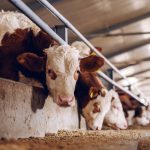The danger of “Big Meat” and how to build a healthier food system
 (NaturalHealth365) Fact: 99 percent of America’s farms are “factory farms,” where millions of animals are crammed into windowless sheds and stuffed into wire cages, and the animal products – meat, dairy, and poultry – routinely contaminated with toxic pesticides, antibiotics, parasites, and pathogens. This is what we refer to as, the “Big Meat” industry and it’s at the heart of some many health issues.
(NaturalHealth365) Fact: 99 percent of America’s farms are “factory farms,” where millions of animals are crammed into windowless sheds and stuffed into wire cages, and the animal products – meat, dairy, and poultry – routinely contaminated with toxic pesticides, antibiotics, parasites, and pathogens. This is what we refer to as, the “Big Meat” industry and it’s at the heart of some many health issues.
We can not ignore this reality: Big Meat is damaging to human health, as it’s loaded with artery clogging (toxic) fat – too much omega-6 and lower levels of beneficial omega-3 – which can lead to obesity, cancer, heart attacks, and a host of other serious and life-threatening health problems.
Did you know that factory farms emit over 200 gases, including hydrogen sulfide and ammonia? These gases further compound Big Meat’s damage to human health and the environment. No, the facts can’t be changed. It’s too late for that. But we can rise up against them, find alternatives and new solutions, and do our part as consumers to consciously boycott Big Meat and its dirty deeds.
The problem with “Big Meat” and a call to action
The alternative to Big Meat is the “Regeneration Revolution,” an umbrella term that involves everything from farming innovation and consumer awareness to political/policy change, and new investment practices.
America eats the cheapest, lowest grade food of any industrial nation. That’s right, taxpayer money helps to support a highly-toxic, food supply that’s slowing poisoning an entire nation.
It’s a problem further exacerbated by American consumers’ love for fast food and highly processed, nutritionally-deficient foods. Roughly 80 percent of Americans patronize fast food restaurants, and the damage from the “Super Size Me” lifestyle is why America has become a leader in chronic diseases statistics and healthcare costs.
But here’s the catch. The alternative to Big Meat is already in place.
We don’t have to reinvent the wheel. The U.S. has a $60 billion market for organic and grass fed and pastured food. In addition, sales of plant-based alternative meat products (Impossible Burger, Beyond, etc.) have skyrockted. According to Neilsen, in May, sales of alternative meat products in grocery stores went up 264 percent. As a side note: we do not suggest that these highly-processed, plant-based burgers are any better for your health.
But, it does illustrate a point. People truly want a greener, happier world. Sadly, politicians, Corporate America and Big Meat have other ideas in mind.
The unraveling of ecosystems and wasting away of “moral imaginations”
Factory farming and the food/water crisis are all aspects of a wider dysboisis – a term commonly used by scientists to describe the collapse of gut biomes, but in recent years has been used to define the unraveling of ecosystems. Radical change is needed to repair this “looming catastrophe,” a catastrophe of interlinked emergencies that scientists warn could result in global systemic collapse.
Change starts with us, the consumers. Boycotting Big Meat will protect our health, protect the health of meat industry workers, protect family farms, farm animals, rural economies, water supplies, air quality, soil health, and wildlife biodiversity.
Take a stand. Support local, organic and regenerative farms. Buy healthy, humane and environmentally-friendly foods.
Author Mark O’ Connell sums it up best: “It’s not the melting of the ice-caps or the burning of the forests that seem to be the real apocalyptic scenario, but rather the slow atrophying of our moral imaginations.”
Sources for this article include:



